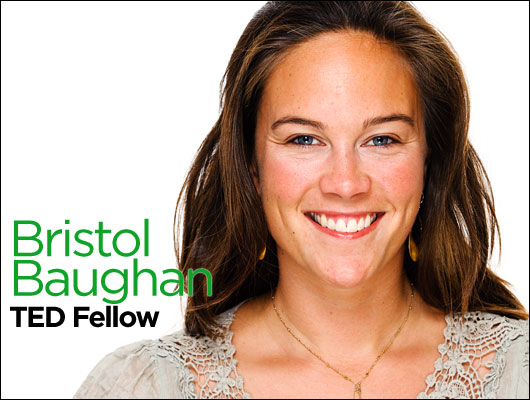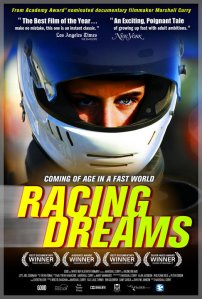Dedicated to finding lasting solutions for complex social challenges, the Case Foundation supports the TED Fellows and their big ideas that draw upon leadership, collaboration and entrepreneurship to change the world. As a new feature to help other up-and-comers and social citizens, every Friday the Case Foundation asks the featured Fellow to share his or her answer to the following question:
There are many aspiring social entrepreneurs out there who are trying to take their passion and ideas to the next level. What is one piece of advice you would give to them based on your own experiences and successes?
The TED Fellows’ answers to this question will be posted on the Case Foundation blog.
Describe yourself and what you do.
It’s hard for me to articulate because I’m in the middle of a transition. I’ve been producing documentaries and launching this company called Good for the last seven years of my life. Now I’m moving in to directing. I’m starting to direct what I’m calling “commercials for ideas.” It’s trying to sell ideas like you would products but it’s really about the ideas. Ideas like self-empowerment, self-reflection, perspective.
This Friday I’m doing a shoot for this concept I have of “What do you bow to? What is the thing you have reverence for?” Whether it’s to your coffee cup, to a baseball team, to a religious icon, or something else. It’s a photo series but I’m going to turn these into commercials eventually. The idea is to start building a directing reel.
I’m also starting to do what I’m calling “personal producing.” I’ve worked with social entrepreneurs and CEOs and directors in helping them fulfill their visions. It’s like life coaching — consulting with people on making their dreams happen.
It’s a work in progress defining myself right now. I’m a producer-director and writing a feature for my directorial debut while making these commercials and building my reel.
Your undergraduate degree is in International Relations. How did you get started in filmmaking?
I took a semester during undergrad and went to NYU. I shot and directed short films there for a semester and realized that’s what I loved. But I didn’t want to stop studying International Relations. I really couldn’t get enough of learning about different parts of the world, especially peace and conflict resolution. I thought these were the kind of stories that I’d love to see films about. I went and did the hands-on work and realized that that was what I wanted, but I also really wanted to keep studying what I was studying and tell these stories.
The whole mission of Good and what I’m doing now is taking relevant stories and make them something that are accessible and move people. That’s what I’m hoping to do with these commercials for ideas.
Tell us more about your commercials for ideas. What is being bought and sold with them?
Well, right now, they don’t exist. I’m basically trying to make something between art and advertising. I’m beginning work on them just as my own passion project. I’m building a portfolio and looking for collaborators, but I want to define what the voice is and figure out my process before I start working with ad agencies and corporations.
Eventually a person I’m interested in reaching out to is Alex Bogusky. He’s a creative director that has made a ton of money working on campaigns for Burger King and so on. He’s left advertising, I believe, to make socially relevant media. I want to work with people in advertising who have been selling products for years and now collaborate with them to sell ideas that empower people.
How are your “commercials for ideas” different than anti-smoking ads or public service announcements?
I find that PSAs are usually issue-centric. For example, the issue may be smoking or that smoking is bad for you. They use body bags and images like that — which I think are great to trigger a response — getting people to respond in any way to any kind of media right now I think is a real challenge. But what’s interesting for me is, what is the level underneath why people are smoking? That’s where I’m trying to dig into.
For example, one idea I have is basically anti-littering and anti-smoking wrapped up into one. When people are smoking they throw cigarette butts on the ground. There’s a disconnect between themselves, this piece of trash, and the Earth. So I’m going to be focusing on that moment where the cigarette butts leave the hand.
Instead of just focusing on the addiction and making people feel bad about themselves, there are a number of levels to what we’re looking at, a number of ways to approach it. We’re leading with the idea, not the issue. Instead of doing a PSA that says stop smoking, I’m going to focus on the amount of cigarette butts that have accumulated and what it’s doing to the environment. So it’s a backdoor into an old argument and it’s trying to find fresh ways of approaching something that helps people to reflect on the issue in a new way.
There are many aspiring social entrepreneurs out there who are trying to take their passion and ideas to the next level. What is one piece of advice you would give to them based on your own experiences and successes?
The Case Foundation is committed to giving a voice and platform for social entrepreneurs, innovators, and changemakers like the TED Fellows who are coming up with big ideas that can change the world. Read this Case Foundation/Fellows Friday question and answer every week on the Case Foundation’s blog.
I think for social entrepreneurs the definitions of success are still under construction, which is what makes it so exciting. It is up to us to define what “success” is.
On the film side I have experienced some incredible critical success, which for me was important because I wanted to make things that moved people. And if it moved people then they would show up to see it, I reasoned. But really it was only a few people that would show up to see some of these movies. That wasn’t considered in the industry — or by any standards — a financial success.
And that was a lesson I had to learn: letting go of the result and the expectation that things are going to be a certain way, and that it wasn’t a success if people didn’t show up. It’s more important to recognize what is it that I love about this, which is storytelling and filmmaking. And that’s what’s going to continue motivating me.
In your recent “Approaching 30 … Spiritually” article on The Huffington Post you said this transitional period in your life feels like “adult puberty.” What would you say about your life right now — are you still in the awkward stage?
In that blog I was saying that I was experiencing growing pains. It’s different now. I’m definitely still in a moment of transition, but instead of feeling this awkward fear of the future, I’m feeling newly motivated by a new energy. Basically, I’ve spent the last year and a half healing and becoming more aware of what motivates me from my center, from the core. And trying to recognize how much of that is ego and how much is really following what I love. So now I have a sense of direction in a way that could easily do a U-turn or change, but feeling less anxious about that.
You co-founded a company, your documentary film Racing Dreams won the jury prize for Best Documentary at the Tribeca Film Festival last year, and you’re are a TED fellow. How can you feel like you’re floundering?
When I turned 27 and was starting to have this sense that my identity isn’t completely equal to what I do for a living, I became motivated to figure out why I didn’t feel fulfilled. It took me going through the pain of leaving the job that I always thought I’d have and the company that I thought was my baby, to recognize that I’d built myself a trench.
It was a beautiful trench and I loved it and we had such a great time in it. But the trench was a belief that this was the only place for me and this is where I’m meant to be. When I recognized that I was in this trench I realized, “Oh! I see that there’s this whole world out there full of opportunity. But I need to climb my way out of this trench.” The trench was this belief that this is what I was meant to do and if I can’t make this work then I’m a failure.
So once I was able to climb up out of that trench I could then see all around me all the trenches that I’ve always had which are the beliefs that I’ve had about myself and the world and how I’m supposed to make a difference because of the opportunities that I’ve been given. So now it’s kind of recognizing which of these beliefs are ones that are serving me and which ones aren’t. Now I’m taking time to figure that out — I think you’re always kind of figuring that out — and recognizing trenches of beliefs.
Helping people out of trenches where they hold on to beliefs so strongly that no longer serve them is something that I’m really excited to do. I can do it for other people. I’ve established the success of doing that. Now I’m thinking I have a few visions of my own to fulfill. What do I need to do to really believe that and then go for it?
I had thought the job I had was the only thing for me. When I recognized that that couldn’t be right because it no longer was fulfilling me, then I was floundering. Floundering has a negative connotation but it’s more like figuring out that you can do anything. How do you let go of the idea that your value is tied to a specific organization or company? I find that most people go through that when they leave a job or are fired from a job — especially something that they care about.
Do you have advice for people who are looking for the passion and maybe feel like they’re floundering?
I think people tend to know what they’re passionate about. Knowing exactly what that looks like in the world or the workplace — that’s a different story. That comes through following a lead. If you feel that you enjoy something you should follow it, take a step in that direction and then sit there patiently for just a little while and things will start to happen.
I’m finding that people who haven’t taken the leap to follow their passion are battling with a sense of unworthiness. One idea I’m dying to sell is: dig into your own shit. Dig into the parts of you that limiting you. Whether that’s through therapy or yoga or any kind of healing. Opening yourself to healing. That to me feels like a really radical step in believing that you’re capable of going after whatever it is you want.
How will your TED experience impact your next steps?
TED was totally awesome. TED embodied for me in a clear way how people from diverse backgrounds coming together to approach something is when incredible things can happen.
Sitting at a table at TED were a composer and a lawyer and a geneticist and an actor and we were all brainstorming how to tell the story of TEDPrize winner Jose Abreu — the way to market his idea. Totally awesome.
The idea of bringing people from diverse backgrounds together to approach a problem is how I want to make everything.



Comments